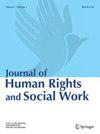阿根廷人孙辈的身份和正义:dna测试是一个转折点
IF 0.8
Q2 SOCIAL WORK
引用次数: 0
摘要
在阿根廷军事独裁统治期间(1976-1983),130名在母亲被囚禁期间出生的失联儿童(desaparecidos)在人权组织的努力下,特别是在他们的祖父母的努力下,被军方亲属绑架。DNA测试被用来验证他们的身份。根据身份权原则,如果孩子们拒绝DNA检测,他们就被迫放弃了自己的隐私权。对10名已确定的孙辈进行了访谈,并将记录整理为6类。所有受访者都认为DNA测试是他们社会身份的转折点。这些意见支持阿根廷的立法方向。本文章由计算机程序翻译,如有差异,请以英文原文为准。
Identity and Justice for Argentinean-Identified Grandchildren: DNA-Testing as a Turning Point
Abstract During the Argentinean military dictatorship (1976–1983), 130 children of desaparecidos (disappeared) born during their mothers’ captivity and then kidnapped by families close to the military were identified thanks to the efforts of human rights organizations and especially of their grandparents. DNA testing was used for verifying their identity. Based on the principle of the right to identity, if the children refused DNA testing, they were forced against their right to privacy. Ten identified grandchildren were interviewed and transcripts were codified in six categories. All interviewees considered the DNA testing the turning point for their social identity. These observations support the Argentinean legislative orientation.
求助全文
通过发布文献求助,成功后即可免费获取论文全文。
去求助
来源期刊

Journal of Human Rights and Social Work
SOCIAL WORK-
CiteScore
2.00
自引率
8.30%
发文量
33
期刊介绍:
This journal offers an outlet for articles that support social work as a human rights profession. It brings together knowledge about addressing human rights in practice, research, policy, and advocacy as well as teaching about human rights from around the globe. Articles explore the history of social work as a human rights profession; familiarize participants on how to advance human rights using the human rights documents from the United Nations; present the types of monitoring and assessment that takes place internationally and within the U.S.; demonstrate rights-based practice approaches and techniques; and facilitate discussion of the implications of human rights tools and the framework for social work practice.
 求助内容:
求助内容: 应助结果提醒方式:
应助结果提醒方式:


